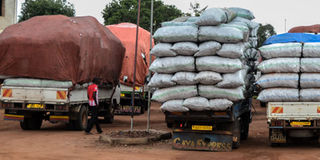District leaders express worry over charcoal ban

Impounded trucks of charcoal parked at Luweero Central Police Station on November 25. The government is stepping up efforts in campaigning against the use of charcoal. PHOTO/DAN WANDERA.
What you need to know:
- In 2017, a Joint Water and Environment Sector Review Report, carried out by the Ministry of Water and Environment, indicated that the country’s forest cover had dropped to 9 per cent, representing a 3 per cent drop in just two years.
- With new markets for charcoal in Kenya and Rwanda, in addition to logging for timber and agricultural land, the pressure on forests can only increase, authorities warn.
- Mr Alex Mabirizi, the chairperson of Buvuma District, said implementing the ban will be extremely difficult since many Ugandans depend on charcoal as their source of livelihood.
Leaders in various districts have expressed mixed reactions about the government’s plan to ban commercial charcoal production.
On November 4, the government announced that it had suspended commercial charcoal production and cancelled licences for forest products harvesting in a bid to check or reduce the wanton tree cutting that is diminishing the country’s forest cover and escalating climate change impacts.
The First Deputy Prime Minister, Gen Moses Ali, made the pronouncement while meeting a European Union delegation in Zoka Forest in Adjumani District.
Although some district authorities view it as a good move to save the dwindling forest cover in the country, many are questioning its practicability since some highly connected individuals within the government are exporting charcoal to neighbouring countries such as Kenya, Rwanda and Democratic Republic of Congo.
Mr Alex Mabirizi, the chairperson of Buvuma District, said implementing the ban will be extremely difficult since many Ugandans depend on charcoal as their source of livelihood.
“It would have been a good idea [to ban charcoal production] if government had already put in place alternative sources of energy which are affordable to the common man, but this is not the case,” he said on Tuesday, adding: “The liquefied petroleum gas which people could be using for cooking is very expensive.”
Currently, more than 90 per cent of Ugandans rely on wood fuel for cooking, with the urban population using mainly charcoal while their rural counterparts use firewood.
Mr Christopher Katumba, the environment police commander in charge of the Greater Mukono area, said they have not received any formal communication from the government to start enforcing the ban but they are ready to act as soon as they are told to.
“It is a good move if we are to save our forests and we are indeed ready to enforce it,” he said.
Mr John Mary Ssekamatte, the Lyantonde District senior environment officer, also pledges to implement the ban if fully supported. However, he said the ban should not be hurriedly enforced because people have no affordable alternative source of energy.
“If commercial charcoal production is banned, very few people in Lyantonde will afford other alternative sources such as the use of gas and electricity, government should not rush,” Mr Ssekamatte said.
Mr Antonio Bagenze, a resident of Kaliiro Sub-county and a charcoal trader for more than 30 years, told Daily Monitor that the government should not ban charcoal production, but enforce existing laws that support environmental protection, for example, planting trees before cutting the mature ones.
Rakai, Kyotera
In the districts of Rakai and Kyotera, the Natural Resources Officers, Ms Silvia Mirembe and Mr Jamil Kiyingi, respectively said they are yet to receive an official communication from the government on the ban.
Mr Kiyingi said though there are still people earning a living from the charcoal, they are doing it illegally, and if the ban is to be enforced, the government needs to first issue tough guidelines because it may be difficult to convince people to abandon the charcoal business.
Mr Jimmy Kananura, a resident of Kakuuto Sub-county in Kyotera District, said some districts though the National Forest Authority (NFA) officials, earn revenue through issuance of licences to charcoal dealers and enforcing the ban might be difficult.
Mr Joseph Kelly Buwembo, the Buvuma District environment officer, said the commercial charcoal production went down in his district after private forests where charcoal dealers were getting trees got bought by government to pave way for a palm oil project.
“We used to charge Shs36,000 for a charcoal production permit per month and another Shs22,000 for those transporting it on a bicycle and motorcycle and Shs60,000 for lorries, but these days, we can hardly get that money,” Mr Buwembo said.
Lyantonde District chairperson Fred Muhangi said although the district doesn’t get revenue from charcoal, residents in the district are earning a living from it. He said the district produces more than 3,000 bags of charcoal every month.
“As a district, we are not benefiting from charcoal production because it is dangerous to the environment,” Mr Muhangi said.
To effectively discourage people from using charcoal, Mr Muhangi said the government should reduce power tariffs and also extend electricity to all villages.
Mr John May Ssekamatte, the Lyantonde District senior environment officer, said if charcoal production is completely banned, very few people in the district will afford the other alternative sources of energy for cooking.
“Government should not rush to ban charcoal production without alternative sources of energy,” he said.
According to Mr Phillipson Mugumya, the National Forestry Authority (NFA) sector manager on Buggala Islands in Kalangala District, enforcing the ban will be difficult because some unscrupulous charcoal dealers smuggle it to Kenya.
“We are aware of the charcoal that crosses to Kenya almost every day, but at times, we fail to apprehend these smugglers,” he said
Kalangala has a total of 31 forest reserves with 19 in the far islands which make it difficult for NFA staff to monitor them.
County’s forest cover
The country has 506 central forest reserves managed by NFA situated in different parts of the country which represents 15 per cent of the total forest cover.
The other 85 per cent forest cover is managed by local governments, individuals and institutions.
Scientists say there is a big linkage between vegetation cover, forests, livelihood and reducing emissions that result in climate change effects such as long dry spells and extreme temperatures, occurrences common to Uganda.
Compiled by Al-Mahdi Ssenkabirwa, Paul Ssekandi, Ambrose Musasizi, Sylvester Ssemugenyi & Derrick Kissa




